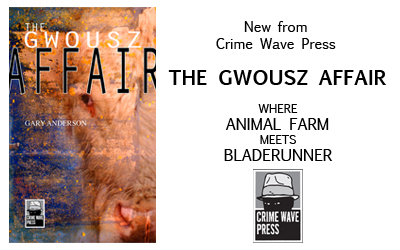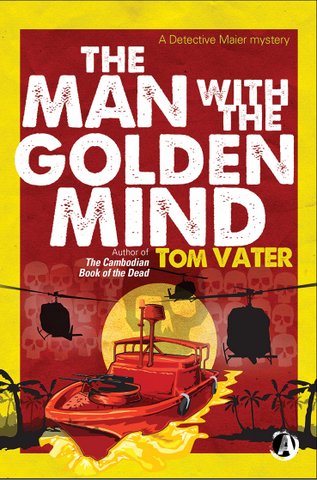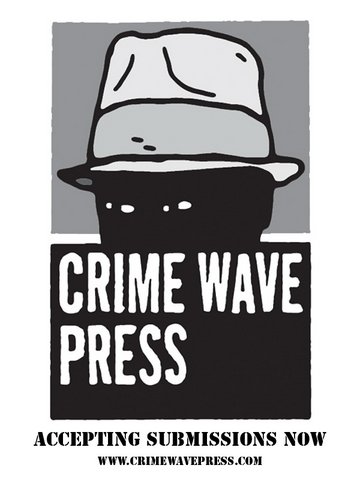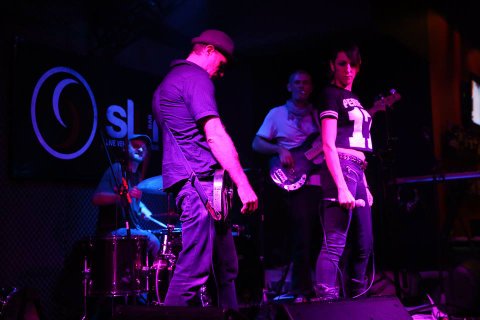
There are certain writers in Thailand that if they were not writers they would make excellent fictional protagonists, because the real-life lives they lead would make for an interesting read. Joe Cummings is one such writer. As is our guest today, Tom Vater. There are many things I like about Tom Vater, the writer and the person. The latter has been known to drop off the grid from time to time, which no doubt helps the former. Tom has published three novels, THE DEVIL’S ROAD TO KATHMANDU, THE CAMBODIAN BOOK OF THE DEAD released by Crime Wave Press in Asia and Exhibit A world wide in 2013 and his latest, THE MAN WITH THE GOLDEN MIND set primarily in Laos, recently released by Exhibit A in the USA and UK as well as being available in Asia and online. Tom returned from the legendary setting of Mandalay in February of this year where he participated in the Irrawaddy Literary Festival and met at least one legend while there, Aung San Suu Kyi.
Tom Vater is the co-owner of Crime Wave Press, along with Hans Kemp. Crime Wave Press is a Hong Kong based English language crime fiction imprint.
In addition to his fictional works Tom has published several non-fiction books, including the critically acclaimed Sacred Skin and the more recent Burmese Light with photographer Hans Kemp. Tom has written for The Wall Street Journal, The Guardian, The Daily Telegraph, The South China Morning Post and Penthouse to name just some.
Tom is also the co-author of several documentary screenplays, most notably The Most Secret Place on Earth, a feature on the CIA’s covert war in 1960s Laos, which you will recognize in The Man with the Golden Mind. Chiang Mai City News is pleased to have Tom Vater here today:
CMCN: What makes South East Asia a good setting for a crime novel?
TV: Given the culture of impunity that reigns even more freely in Asia than where I come from, or at least in a more visible manner, the amount of salacious material is never-ending. Open the papers and stories too hair-raising to be made up tumble from the pages every single day. SE Asia is a treasure trove of human divinity and depravity and as the weather is always good, a lot of it spills out into the open to be scooped up by writers, journalists or voyeurs. That said, almost anywhere is good to set a crime novel. I just happen to know this corner of the world a little.
CMCN: What book(s) or music influenced you growing up?
TV: Treasure Island was a big book for me. Long John Silver was and is one of my great literary heroes, a bad man, but not a man without compassion. My teenage years were taken up by Jack London, Edgar Allen Poe, William Golding, George Orwell and H.P. Lovecraft. Then I discovered the Beats – Kerouac, Bowles, Burroughs and Bukowski – and the Hardboiled Noirs –Chandler, Himes, Goodis, Thompson, Highsmith and Ross MacDonald… and everything changed.
But I also took an early liking to literary garbage – I obsessively read Enid Blyton’s adventure novels and still suffer from the fall-out.
When I was 14, I saw Elvin Jones play a show in my home town. After the first song they had to nail his drum kit to the stage. That always stayed with me.
But I didn’t get into Jazz until I was older. From the age of 8 or so, I listened to RocknRoll, and from 15, I tried to play in bands. I first got into Black Sabbath and Deep Purple and then advanced (or regressed, depending on your point of view) to Elvis, Jerry Lee Lewis, The Rolling Stones, The Velvet Underground, the MC5, The Stooges, Black Flag, The Cramps and CAN.
I always liked the monotony and repetitiveness of RocknRoll. Three minutes of high energy. Very different form of expression from fiction of course, but I somehow have an affinity for both.
CMCN: What’s the last record or book you can remember listening to or reading?
TV: I listened to Get Yer Ya-Ya’s Out by The Rolling Stones and Rubber Legs by The Stooges today. Also really into British band Fat White Family (http://noisey.vice.com/en_uk/blog/fat-white-family-touch-the-leather-music-video-premiere) at present. They got the spirit. Best bands I have seen in Bangkok recently are Degaruda, The Sangsom Massacre and Dead Town Trash.
I am reading The White Flamingo by James Newman, a sleazy slice of gutter-style Hardboiled with great Beat-style stream of un-consciousness writing.
My other favorite recent read is The Gwousz Affair by Gary Anderson, a Sci Fi Noir novel Crime Wave Press has just put out. It’s set in 2042 and humans have made cows intelligent, the planet is run by bovines, the US government has moved to Nebraska, all humans are vegetarians and inter-species sex is permissible. Enter a hardboiled PI who is to find the killer of the female offspring of the bovine president. Think Animal Farm getting into bed with The Big Sleep and Bladerunner.
CMCN: Is there a book out there or laying around your home that you’ve been meaning to read but haven’t gotten around to it yet?
TV: There are stacks of those lying around. I’ve had a David Goodis and a Massimo Carlotto sitting on my shelf for months – no time to take a look yet. On the next long flight.
CMCN: Complete this sentence: Amazon.com is …
TV:…symptomatic of the way business has gone in the early 21st century.
CMCN: Make the case for fiction over non-fiction in 100 words or less.
TV: It’s often easier for me to get at a larger truth in fiction. And the process of writing fiction is the most beautifully obsessive skill I have. I basically move in with my characters and every day I start writing I find that they have done stuff during the night I didn’t ask them to do. In a way, the writing process becomes like an intense love affair, but with a whole bunch of people craving my attention while they slowly reveal themselves to me emotionally, physically and intellectually. When this happens, I am very, very happy.
CMCN: Tell our readers about your latest crime novel, The Man with the Golden Mind and why they should read it?
TV: Julia Rendel asks Detective Maier, whom I introduced in last year’s The Cambodian Book of the Dead, to investigate the twenty-five year old murder of her father, an East German cultural attaché who was killed near a fabled CIA airbase in central Laos in 1976. But before the detective can set off, his client is kidnapped right out of his arms. Maier follows Julia’s trail to the Laotian capital Vientiane, where he learns different parties, including his missing client are searching for a legendary CIA file crammed with Cold War secrets. But the real prize is the file’s author, a man codenamed Weltmeister, a former US and Vietnamese spy and assassin no one has seen for a quarter century.
Almost a decade ago, I co-wrote the screenplay to The Most Secret Place on Earth (http://www.youtube.com/watch?v=i8cIki7awN8) a feature documentary directed by my brother Marc Eberle, about the CIA in Laos. Between 1965 and 1973, the US secret service ran a clandestine war against the Laotian communists, secretly recruiting 30.000 ethnic minority mercenaries, many of whom died in battle. The agency partly financed its efforts with drugs and eventually bombed the country to bits.
During the making of the film, I met some of the people involved in that conflict – CIA case officers, Air America pilots, USAid staff, Hmong rebels, Thai mercenaries, journalists and academics and I always wanted to write a fictionalized account of what we felt was a war crime committed by the US that had almost been forgotten.
Oh, and in The Man with the Golden Mind, the most infamous former US Foreign Secretary makes a cameo appearance. Who’d want to miss that? As I said, in fiction it’s sometimes easier to go after larger truths than in non-fiction.
CMCN: Please tell me your three favorite dead authors? Or if you are feeling confident you can throw some live ones into the mix?
TV: Dead ones: Joseph Conrad, William Burroughs, Jim Thompson
Live ones: Katherine Dunne, Philip Kerr, Gary Anderson
CMCN: Tell me about your publishing house. What are the challenges of a boutique publisher in an Amazon age?
TV: I run Crime Wave Press (www.crimewavepress.com) with Hans Kemp and we have been publishing crime fiction, in eBook and POD format, for a year and a half now. We started off with Asian based titles, but soon noticed that we couldn’t find enough good manuscripts in the region to publish the number of books we need to make the enterprise worthwhile. That said, our Father Ananda Mysteries by Nick Wilgus, a series of clerical thrillers featuring a cop turned Buddhist monk in Thailand, are doing quite well, as does our international thriller Gaijin Cowgirl by Jame DiBiasio, and my first novel, republished by CWP, The Devil’s Road to Kathmandu, is selling ok and is also available in Spanish.
Now that we read submissions from all over the world, we are releasing titles more frequently, and – hallo writers out there – we are reading manuscripts at present – so get in touch.
Any subgenre of crime fiction will be considered, novels and novellas, but no True Crime, no short stories and no children’s books or graphic novels.
Crime Wave Press will be represented at both the London and Frankfurt book fair this year and we hope to make more international rights sales.
CMCN: What does The Year of the Horse have in store for you?
TV: I had a good start with Crime Wave Press invited to the Irrawaddy Literary Festival in Mandalay in February and The Man with the Golden Mind coming out a couple of weeks ago.
In the summer, American photographer Kraig Lieb will publish Cambodia: A Journey Through the Land of the Khmer, for which I wrote the text.
The next two Crime Wave Press titles, Death Sentences by Michael Zemecki, a personal (and fictional) account of a white supremacist on death row in the US – a kind of Ed Bunker meets Charles Bukowski at death’s door – and the first Detective Le Fanu Adventure The Madras Miasma by Brian Stoddart, a gripping crime novel set in 1920s British India, are in the pipeline.
Tom Vater on stage with Laura J. Snook in Cambodia
I’ll travel. I’ll play some music. I’ll write another novel.
Thanks very much, Kevin, for having me.
TF: Thank-you, Tom.

This interview first appeared at Thailand Footprint



